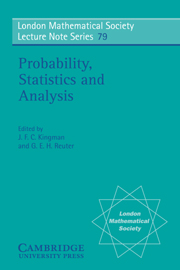Book contents
- Frontmatter
- Contents
- The asymptotic speed and shape of a particle system
- On doubly stochastic population processes
- On limit theorems for occupation times
- The Martin boundary of two dimensional Ornstein-Uhlenbeck processes
- Green's and Dirichlet spaces for a symmetric Markov transition function
- On a theorem of Kabanov, Liptser and Širjaev
- Oxford Commemoration Ball
- Invariant measures and the q-matrix
- The appearance of a multivariate exponential distribution in sojourn times for birth-death and diffusion processes
- Three unsolved problems in discrete Markov theory
- The electrostatic capacity of an ellipsoid
- Stationary one-dimensional Markov random fields with a continuous state space
- A uniform central limit theorem for partial-sum processes indexed by sets
- Multidimensional randomness
- Some properties of a test for multimodality based on kernel density estimates
- Criteria for rates of convergence of Markov chains, with application to queueing and storage theory
- Competition and bottle-necks
- Contributors
Invariant measures and the q-matrix
Published online by Cambridge University Press: 05 April 2013
- Frontmatter
- Contents
- The asymptotic speed and shape of a particle system
- On doubly stochastic population processes
- On limit theorems for occupation times
- The Martin boundary of two dimensional Ornstein-Uhlenbeck processes
- Green's and Dirichlet spaces for a symmetric Markov transition function
- On a theorem of Kabanov, Liptser and Širjaev
- Oxford Commemoration Ball
- Invariant measures and the q-matrix
- The appearance of a multivariate exponential distribution in sojourn times for birth-death and diffusion processes
- Three unsolved problems in discrete Markov theory
- The electrostatic capacity of an ellipsoid
- Stationary one-dimensional Markov random fields with a continuous state space
- A uniform central limit theorem for partial-sum processes indexed by sets
- Multidimensional randomness
- Some properties of a test for multimodality based on kernel density estimates
- Criteria for rates of convergence of Markov chains, with application to queueing and storage theory
- Competition and bottle-necks
- Contributors
Summary
Abstract
This paper provides a necessary and sufficient condition for a measure to be invariant for a Markov process. The condition is expressed in terms of the q-matrix assumed to generate the process.
Introduction
Let Q = (qij, i, j ∈ S) be a stable, conservative, regular and irreducible q-matrix over a countable state space S, and let P(t) = (Pij(t), i, j, ∈ S) be the matrix of transition probabilities of the Markov process determined by Q. If(the Markov process determined by) Q is recurrent then the relations
have a solution m = (mi, i ∈ S), unique up to constant multiples. Call m an invariant measure for P(t) if
When Q is positive recurrent it is known (Doob [5], Kendall and Reuter [13]) that a solution m to (1) is an invariant measure for P(t). This conclusion also holds when Q is null recurrent, but may not when Q is transient. When Q is transient the set of solutions to (1) may be empty or it may contain linearly independent elements: we obtain a necessary and sufficient condition for a given element of the set to be an invariant measure for P(t).
The basic properties of Markov processes which will be needed are taken from Kendall [11] and are briefly stated in Section 2: they can also be found in [3], [6], [10], [12], [13] and [17]. Section 3 contains the main result of the present paper. Here it is shown that a solution to (1) is an invariant measure for P(t) if and only if a time-reversed q-matrix, defined in terms of m and Q, is regular. It is convenient to obtain the result assuming only that Q is stable and conservative, with P(t) the minimal (Feller) transition matrix determined by Q.
- Type
- Chapter
- Information
- Probability, Statistics and Analysis , pp. 143 - 160Publisher: Cambridge University PressPrint publication year: 1983
- 30
- Cited by



